African American Study Of Kidney Disease And Hypertension
African american study of kidney disease and hypertension. The African-American Study of Kidney Disease and Hypertension was a randomized double-blind controlled trial designed to determine whether strict blood pressure BP control angiotensin-converting enzyme inhibitor ACEI-based or calcium channel blocker CCB-based regimens were superior to less strict BP control and beta-blocker BB-based regimens respectively. Actual Study Completion Date. The final results of the African American Study of Kidney Disease and Hypertension AASK have shown that the angiotensinconverting enzyme inhibitor ramipril was better than the β blocker metoprolol or the dihydropyridine calcium channel blocker amlodipine in slowing the rate of glomerular filtration rate decline in African American patients with mild to moderate renal insufficiency.
Actual Study Start Date. Overview The study will be conducted in participants in the African-American Study of Kidney Disease AASK Cohort study as a randomized three period cross-over trial. In a cohort of African Americans with hypertension-attributed chronic kidney disease followed for up to 12 years we used Cox proportional hazards models to estimate the relative hazard of a composite cardiovascular disease outcome cardiovascular death or hospitalization for myocardial infarction cardiac revascularization procedure heart failure or stroke for the APOL1 high-.
Failure according to guidelines from the American College of Cardiology. Anúncio High blood pressure dramatically increases the risk of a heart attack stroke and heart. African-Americans bear a disproportionate burden of this debilitating disease.
The trial popu-lation includes nondiabetic African Americans with. The final results of the African American Study of Kidney Disease and Hypertension AASK have shown that the angiotensin-converting enzyme inhibitor ramipril was better than the beta blocker metoprolol or the dihydropyridine calcium channel blocker amlodipine in slowing the rate of glomerular filtration rate decline in African American patients with mild to moderate renal insufficiency. Failure according to guidelines from the American College of Cardiology.
The current trial sought to study the effects of an intensive blood pressure target as compared with a traditional blood-pressure target on the progression of chronic kidney disease among black patients with hypertensive chronic kidney disease. The primary objective of the African American Study of Kidney Disease and Hypertension AASK Cohort Study is to identify risk factors for progressive kidney disease in African Americans with hypertensive chronic kidney disease in the setting of recommended antihypertensive therapy. Anúncio High blood pressure dramatically increases the risk of a heart attack stroke and heart.
12 13 Although the AASK is powered primarily to detect differences in renal function the. African American Study of Kidney Disease and Hypertension. The African American Study of Kidney Disease and Hypertension AASK is an ongoing 21-center randomized double-masked trial to determine the effect of lower blood pressure levels and choice of initial antihypertensive drug selection on the rate of decline of glomerular filtration rate GFR assessed by iothalamate clearance.
The study was conducted in 2 phases beginning in 1995. STUDY DESIGN The AASK is an ongoing study in self-identified African Americans with hypertension aged 1870 years with a glomerular filtration rate GFR be-tween 20 and 65 mlmin 173 m2.
Anúncio High blood pressure dramatically increases the risk of a heart attack stroke and heart.
The African-American Study of Kidney Disease and Hypertension was a randomized double-blind controlled trial designed to determine whether strict blood pressure BP control angiotensin-converting enzyme inhibitor ACEI-based or calcium channel blocker CCB-based regimens were superior to less strict BP control and beta-blocker BB-based regimens respectively. Overview The study will be conducted in participants in the African-American Study of Kidney Disease AASK Cohort study as a randomized three period cross-over trial. Failure according to guidelines from the American College of Cardiology. African-Americans bear a disproportionate burden of this debilitating disease. Failure according to guidelines from the American College of Cardiology. Eighty five percent of AASK cohort participants are currently on an ACE inhibitor or angiotensin receptor blocker. In September 2000 the National Institute of Diabetes and Digestive and Kidney Diseases of the National Institutes of Health called an early halt to the amlodipine arm of the African American Study of Kidney Disease and Hypertension AASK trial after careful deliberation by an independent data and safety monitoring board. In a cohort of African Americans with hypertension-attributed chronic kidney disease followed for up to 12 years we used Cox proportional hazards models to estimate the relative hazard of a composite cardiovascular disease outcome cardiovascular death or hospitalization for myocardial infarction cardiac revascularization procedure heart failure or stroke for the APOL1 high-. Anúncio High blood pressure dramatically increases the risk of a heart attack stroke and heart.
Failure according to guidelines from the American College of Cardiology. The final results of the African American Study of Kidney Disease and Hypertension AASK have shown that the angiotensin-converting enzyme inhibitor ramipril was better than the beta blocker metoprolol or the dihydropyridine calcium channel blocker amlodipine in slowing the rate of glomerular filtration rate decline in African American patients with mild to moderate renal insufficiency. African American Study of Kidney Disease and Hypertension. Actual Study Start Date. Overview The study will be conducted in participants in the African-American Study of Kidney Disease AASK Cohort study as a randomized three period cross-over trial. The AASK trial is the first of its kind in the African American population and provides a unique array of information relating to hypertensive nephrosclerosis in this population. The African American Study of Kidney Disease and Hypertension AASK is designed and powered to prospectively assess whether aggressive lowering of BP andor class of antihypertensive agent used to initiate BP control differed in their ability to attenuate the rate of GFR decline in a high-risk population.



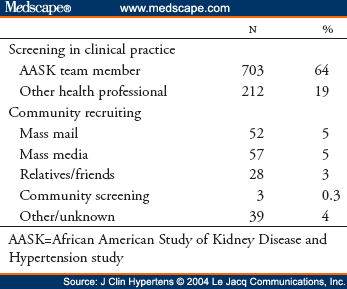




















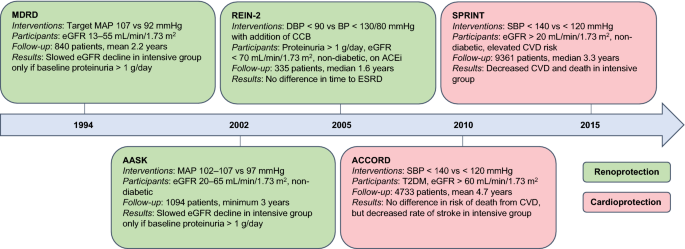
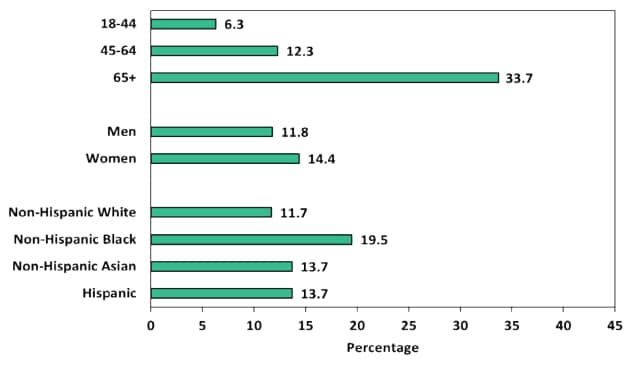



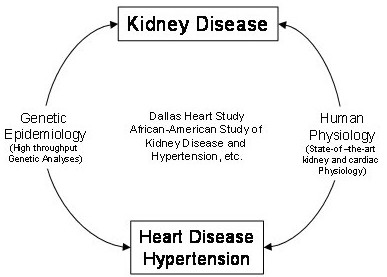








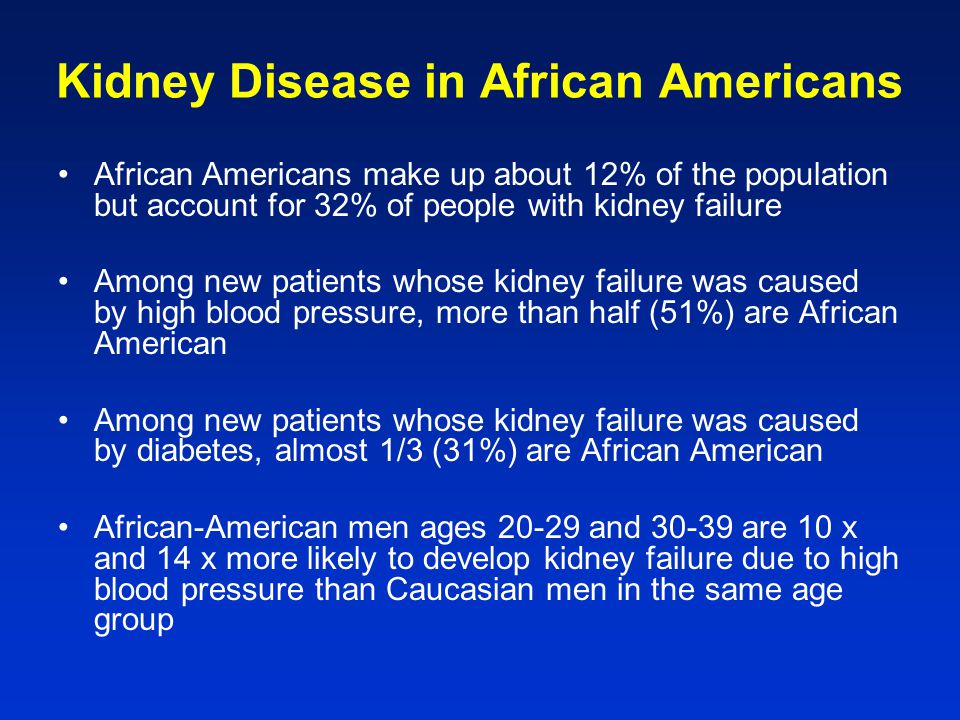


/kidney-disease-causes-5b2a74c38023b900377a00d3.png)




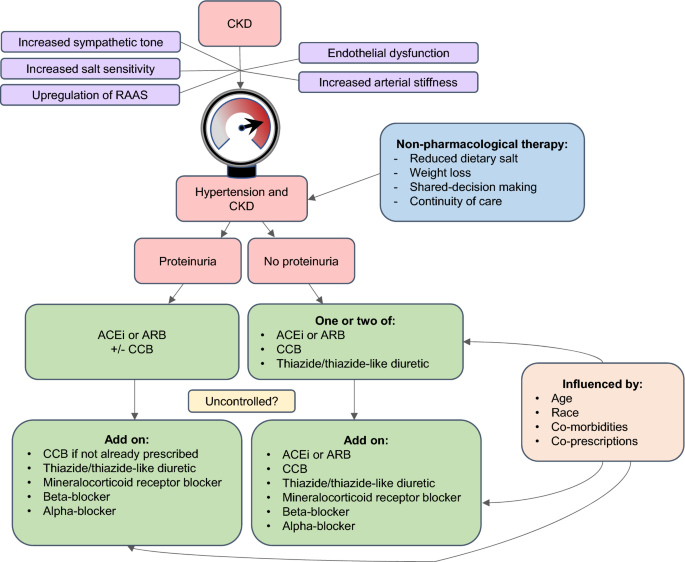
Post a Comment for "African American Study Of Kidney Disease And Hypertension"